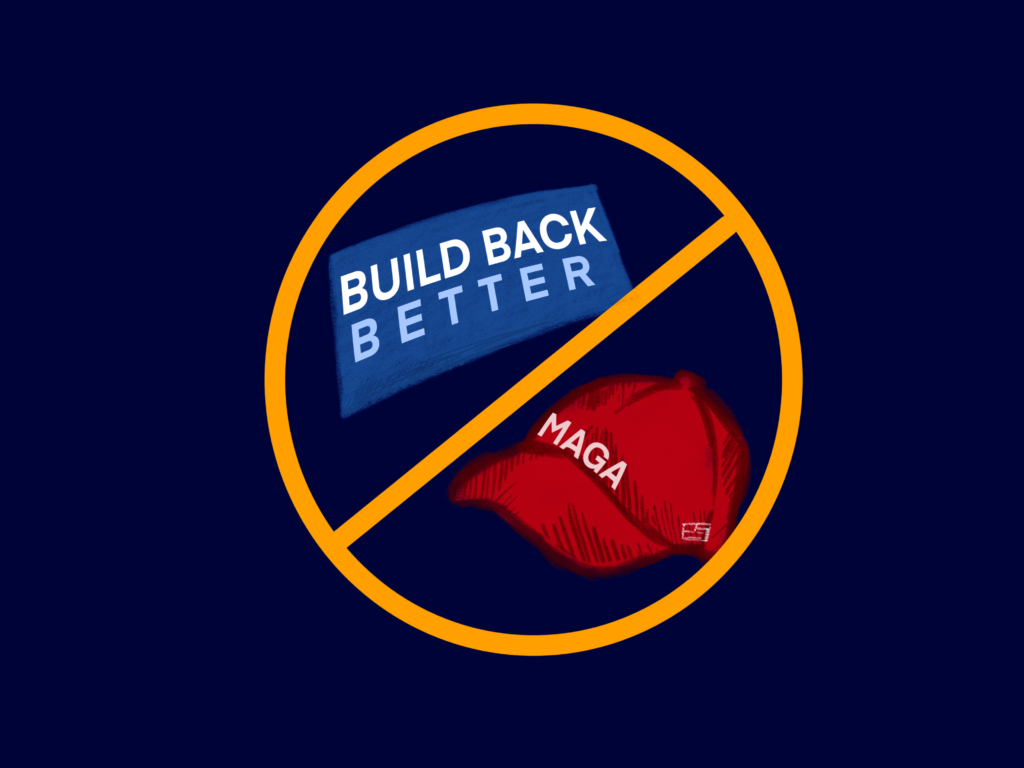
Graphic by Sage Setty/The Choate News
While Choate may be known for its permissive dress code in the classroom compared to the required blazers and skirts of other boarding schools, there’s now one specific article of clothing that students can’t sport in the classroom: political candidate merchandise.
With just 18 days to go until the presidential election, new restrictions, announced by the School on October 8, prohibit any form of political apparel or signage — including T-shirts, hats, stickers, even Zoom virtual backgrounds — from both in-person and online academic spaces.
The policy was conceived by four faculty members who make up the committee on policies and procedures — Assistant Athletic Trainer Ms. Tanisha Clark, HPRSS Department Head Ms. Kyra Jenney, English teacher Mr. Joe Lampe, and Associate Head of School Ms. Kathleen Wallace. This subgroup is a component of the larger planning committee on support for BIPOC students and faculty, which is one of the six new planning committees established last summer.
In line with the committee’s objective and the School’s values, the policy is designed to make Choate a more welcoming and safe place for all students, especially students of color.
According to the policy, certain forms of political expression can infringe upon that comfort. “Especially after @BlackatChoateOfficial, @QueeratChoate, and @LifeatChoate, we knew that there needed to be a change — that we needed to start stepping in the right direction,” Ms. Clark said. “Being a Black woman, I want to make [the School] a safe place for people who identify like me.”
The new rules acknowledge that certain political apparel carries discriminatory connotations that can act as a trigger for many students and take a serious toll on their wellbeing.
Allyson Alavez ’22 said, “As a person of color, those things can be really detrimental to your mental health…Because Choate prides itself on being so diverse, they’d be doing a disservice to the students of color on campus by not trying to protect them.”
Although most political apparel is banned only from academic spaces, now, anything bearing a political slogan is not allowed anywhere on campus, even in extracurricular or residential contexts.
“We thought that those slogans were a way of shutting down conversations,” Ms. Clark said on the choice to differentiate between slogans and candidate names. “You’re saying, this is how I feel, period. With names, on the other hand, [someone can ask] ‘Oh, how do you feel about this person?’”
This ban on slogans, in particular, has attracted mixed reactions from students. While the policy is neutral in its specifications, students from both sides of the political spectrum agreed that Democratic nominee Joe Biden’s “Build Back Better” tagline was not its driving concern. Conor Brown ’22, the president of Young Republicans, expressed that felt that the policy was directed towards one specific slogan. He said, “Let’s be blunt: this is a restriction simply targeted at the slogan ‘Make America Great Again.’”
Donald Trump’s P’00 controversial campaign slogan can be interpreted differently by students. While acknowledging that the slogan can be seen as “provocative,” Brown said, “The slogan ‘Make America Great Again’ is pretty simple to Republicans. It means that we want to make America great again.”
For Alavez, though, that statement carries contextual weight. “The slogan can be really harmful because if you believe that Donald Trump is making America great, you’re ignoring the greater social issues [and] the racism, sexism, [and] xenophobia that Donald Trump stands for,” she said.
The policy also raises concerns for some that Choate is preventing open political dialogue by interfering with students’ freedom of expression.
According to Brown, Choate becomes a lesser school when it doesn’t actively promote discourse and dialogue among students.
The text of the policy states that its purpose isn’t to obstruct respectful conversation, but to draw a line when that conversation begins to disrespect someone’s identity — staying conscious of the fact that political apparel can carry harmful connotations for BIPOC students.
Mr. Ned Gallagher, a HPRSS and English teacher who is also the adviser to Young Democrats, said that simple political discourse and “comments about someone’s identity — immutable qualities that have to do with racial identity, sexuality, things like that — are really different.” He added, “We want to have kids feel safe at Choate.”
Mr. Gallagher has observed that political discussions in his classes, which are known among many students for their political discourse, are mostly balanced and considerate. “From what I see in class, kids feel empowered to speak their mind, and they’re doing so in a civil and respectful way.”
Brown believes that polarization is a growing problem on campus, particularly between Young Republicans and Young Democrats. He cites a major cause of this division to some students’ unwillingness to “separate the issues at play” – the difference in policy between the two presidental candidates – “from Donald Trump as a person.”
According to Ms. Clark, these associations are a major part of what the new restrictions on apparel hope to combat. When students see each other wearing political apparel, she said, it’s easy for them to make extreme assumptions about each other’s values. “We don’t want our students to think like that. We’d rather have everyone think of everyone as equals and try to have those engaging conversations and debates,” she said.
This policy is just one of the School’s many new initiatives designed to support and uplift BIPOC students in the wake of the nation’s racial reckoning that began in May. Other initiatives include the creation of the Diversity, Equity, and Inclusion (DEI) Task Force in July and the identity-based slur policy, which was added to the Student Handbook in September.
The ultimate goal, Ms. Clark said, is “to be a community where everybody feels welcome.”




